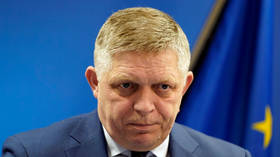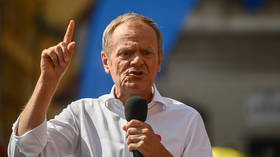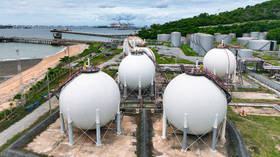EU commissioner Thierry Breton suggests Brussels could block vaccine exports to UK if it fails to comply with Brexit terms

The EU could block the export of coronavirus vaccines to the UK if Boris Johnson’s government fails to comply with the terms of the Brexit trade agreement, the bloc’s single-market commissioner Thierry Breton has suggested.
In an interview with the French newspaper Le Figaro, the European Commissioner for the Internal Market Thierry Breton issued a warning to London about the need to respect the terms of the UK’s exit agreement signed in December 2020, specifically bringing up the issue of Covid-19 vaccines.
The UK “imports half its vaccines from the EU and also from India,” Breton told Le Figaro. Its dependence on external vaccine sources could increase, he noted, pointing to the fast spread of the Delta variant of the virus. He added that MRNA vaccines such as the Pfizer-BioNTech jab appear to be offering the best protection against the variant – and that Brits had not anticipated being so dependent on imports of vaccines from other countries.
The interview came on the fifth anniversary of the Brexit vote, which Breton slammed as a major mistake.
Brexit has been a terrible misunderstanding which isolates the United Kingdom.
Breton also criticized Johnson for procrastinating on the so-called “Irish Protocol”, an agreement which provides for controls on goods traded between Great Britain and Northern Ireland, which, thanks to Brexit, has become the EU’s external border with a non-member state.
On Tuesday, Britain’s Brexit minister and top negotiator David Frost repeated his wish to see “a more pragmatic approach from the European Union” on the subject. According to Breton, however, the trade deal must be fully implemented and the deal honored.
“We will absolutely not go back on what was signed” Breton retorted, arguing the time for pragmatism was over. Breton went on to say that the trade agreement, which establishes trade without quotas or tariffs, is “in danger given the inability of Boris Johnson to honour it”.
Breton’s comments follow a statement earlier this month by the EU commission reiterating that the UK must fully implement the Irish Protocol.
The comments came after the UK requested that the EU suspend the so-called ‘sausage ban’, asking to extend a grace period on the prohibition of the sale of chilled meat exports from Great Britain to Northern Ireland, which is due to expire at the end of June.
Also on rt.com 400,000 EU citizens living in the UK given 28-day warning to apply for post-Brexit right to remainThe EU countered that would only be possible if the UK adheres to the Irish Protocol, under which strict phytosanitary checks must be conducted at the Northern Irish border on fresh food imports from Britain.
The measure is aimed at protecting the EU’s single market while avoiding a hard border between Northern Ireland and the Republic of Ireland, which is an EU member state.
British officials have claimed that the red tape has interrupted Northern Irish supply chains, causing supermarkets in the country to experience product shortages earlier this year.
Four vaccines have been approved for use in the UK: Pfizer-BioNTech, which is made in Europe; Oxford-AstraZeneca (developed and produced in the UK); and the American-made Moderna and Janssen jabs.
The EU had previously criticized the UK, arguing that it had an unfair advantage in contracts signed with vaccine manufacturers, some of whom have factories located in the EU. In March, EU leaders considered a ban on exports of vaccines to the UK but decided against it, instead calling for more transparency from the UK on the number of doses it exports.
Think your friends would be interested? Share this story!














